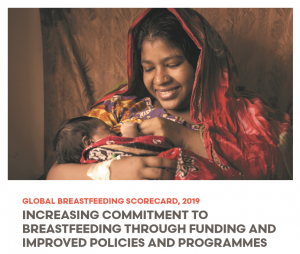
Breastfeeding has numerous benefits for both mothers and children. It stimulates cognitive development and protects infants against diarrheal infections and pneumonia. It also decreases the risk of obesity and chronic diseases such as type II diabetes. It serves as a protection against ovarian cancer and breast cancer among nursing mothers and assists them with birth spacing. Breastfeeding results in lower healthcare costs. Countries’ investment towards improving breastfeeding practices would result in US $35 of economic return per dollar invested. Inadequate breastfeeding rates result in economic losses of about US $302 billion annually, which represents 0.49% of the world’s Gross National Income (GNI). Increasing breastfeeding could prevent 823,000 annual deaths in children under five and 20,000 annual deaths from breast cancer.
Governments play a fundamental role in protecting the health of women and children through improving policies and programmes that support and enhance breastfeeding. The Global Breastfeeding Collective (the Collective), led by WHO and UNICEF, has identified seven policy action priorities, each with an indicator and a set target to be achieved by 2030.
The Global Breastfeeding Scorecard was first introduced by the Collective in 2017. It examines these indicators at the national and global levels. The Scorecard is designed to encourage and document progress on the promotion, protection and support of breastfeeding.
More related resources from WHO: